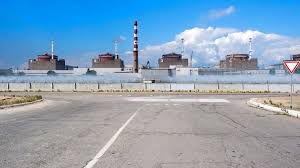The UN’s nuclear watchdog has issued a warning over the weekend that the safety situation at Ukraine’s Zaporizhzhia nuclear power plant was “deteriorating” after a nearby drone strike.
Recall that earlier on Saturday, Russia accused Ukraine of dropping an explosive charge on a road near the occupied plant in southern Ukraine. The plant, which was seized by Russia’s forces early in the war, has come under repeated attacks that both sides have accused each other of carrying out.
International Atomic Energy Agency (IAEA) experts on site were informed of the detonation near essential plant facilities on Saturday and immediately visited the area, the agency said in a statement.
They reported that the damage “seemed to have been caused by a drone equipped with an explosive payload”, affecting the road between the plant’s two main gates.
“Yet again we see an escalation of the nuclear safety and security dangers facing the Zaporizhzhia nuclear power plant,” the IAEA head, Rafael Grossi, said in the statement. “I remain extremely concerned and reiterate my call for maximum restraint from all sides,” he said.
Read also: Report: Net-zero transition will deliver at least ‘£164bn in benefits’ to UK
The “nuclear safety situation” at the plant was “deteriorating”, the statement said. “The IAEA team on site reported “intense” military activity over the past week in the area, including very close to the plant, it added.
“The team has heard frequent explosions, repetitive heavy machine-gun and rifle fire and artillery at various distances from the plant,” it said.
Since Russia’s invasion of Ukraine in 2022, the IAEA has repeatedly urged restraint, saying it fears reckless military action could trigger a serious nuclear accident at the plant. Kyiv and Moscow traded blame last weekend after a fire broke out at a cooling tower at the plant.
IAEA experts were able to visit the base of the cooling tower but have requested further access to assess the situation, according to the Vienna-based nuclear watchdog. The fire resulted in “considerable damage”, but there was no immediate threat to nuclear safety, the agency said.
Story was adapted from the Guardian.
